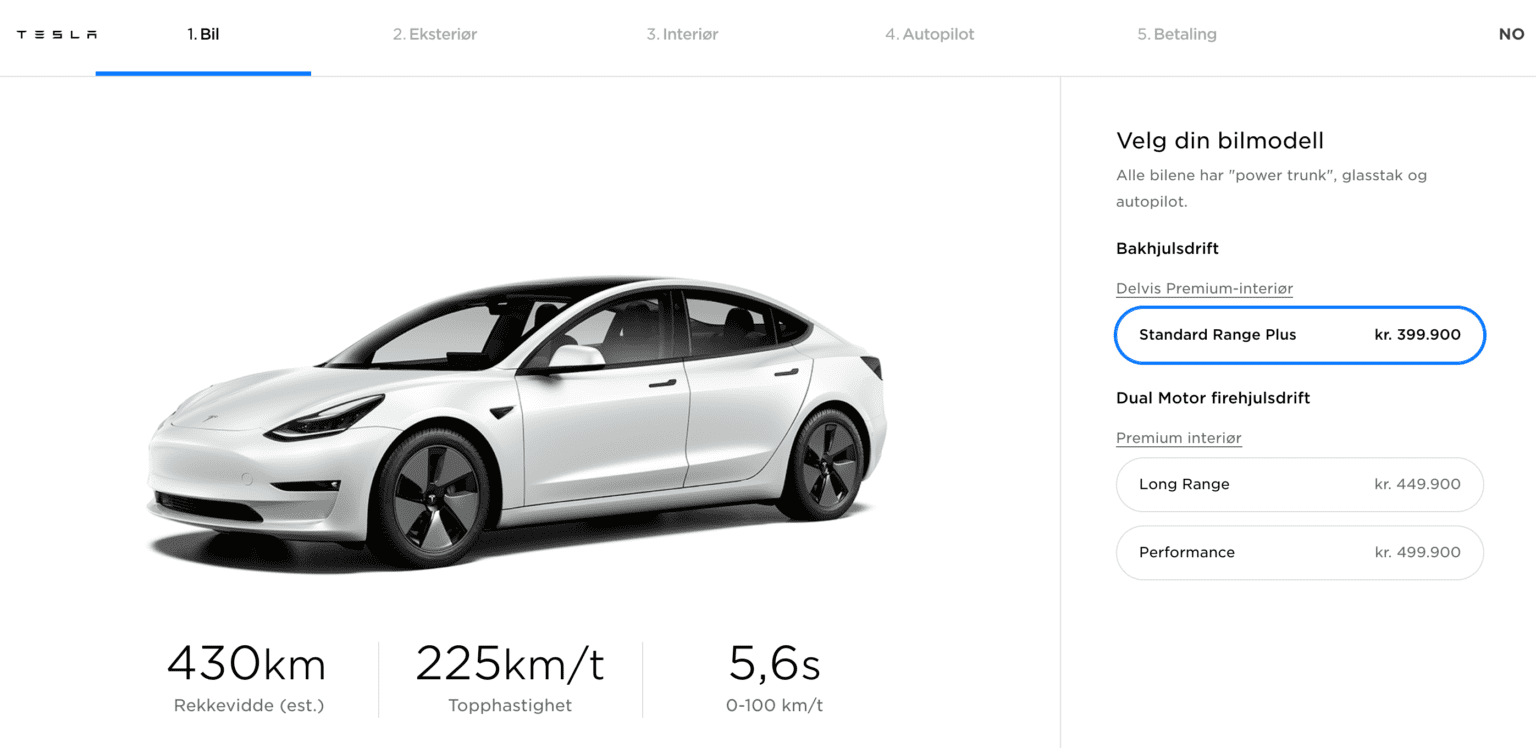There’s been a whirlwind of Tesla vehicle changes lately — a range increase for the Model X, numerous changes to the Model 3, a humorous price cut for the Model S, the 7-seat Model Y coming around the corner, and more. One more that seemed worth highlighting is that the Model 3 just got some notable price cuts in Norway.
The reasons for the price cuts are not entirely clear (lower production costs? lower shipping costs? weakening demand? currency/exchange rate changes?), but I’ll come back to that at the bottom. It’s also not clear if there have been price changes in other European markets as well. (Let us know if you’ve noticed some!) However, when it comes to the consumers, nothing else really matters. It just matters that the price has dropped — by several thousand dollars (tens of thousands of Norwegian kroner.
The price of the Tesla Model 3 Performance hasn’t changed. It’s 499,900 kroner ($53,293). The price of the other two trims changed as follows:
- Model 3 Standard Range Plus: 430,900 kroner → 399,900 kroner ($45,937 → $42,632)
- Model 3 Long Range: 484,900 kroner → 449,900 kroner ($51,694 → $47,962)

The Tesla Model 3 is the top selling electric vehicle in many markets and globally, and Norway is by far the top market in the world for EV market share, but the Model 3 is not #1 in Norway. After the first 3 quarters of 2020, the Tesla Model 3 is #5 in Norway — behind the Audi e-tron, Volkswagen e-Golf, Hyundai Kona EV, and Nissan LEAF.

Worth noting is that Tesla basically sells all the cars it produced quarter after quarter. So, a lack of sales in one market doesn’t necessarily mean a lack of consumer demand — it could be that Tesla is prioritizing other markets. However, this is definitely an unusual placing for the Model 3 and it has many wondering if a mature EV market (like Norway’s) means much less Tesla dominance.
Also worth noting is that Norwegians have been buying EVs so much for so long, favoring Tesla for years, that the vast majority of people who want a Tesla may already have one (or two).
We simply don’t know what’s going on with Tesla in Norway, so I’m not making any assumptions without more info.
Regarding the price cuts, though, Din Side reports that the reason for them is simply the exchange rate changing. (Tesla has made price changes in foreign markets for years due to ever-changing exchange rates — it’s a normal thing to do.) Tesla’s communications director, Even Sandvold Roland, could not confirm that explanation, because he noted they never comment directly on price changes. But he did say that he didn’t think it was a great time for a price cut there because they have been having a lot of difficulties with logistics/deliveries during the coronavirus pandemic. But, from a consumer’s perspective, a price cut is always a good thing.
As one final note on price changes in Norway, E24.no explains that even with these notable price cuts, the Model 3 is more expensive than it was 6 months ago in Norway. Wait, what? Tesla raised the prices of all of its models in April in Norway. The Model 3 Standard Range Plus increased in price by NOK 46,000 ($4,904), from NOK 384,900 ($41,033) to NOK 430,900 ($45,937) at that time. That means that, even with this week’s price drop to 399,900 kroner, the Model 3 Standard Range Plus is NOK 15,000 ($1,599) more expensive than it was in March. Again, this all seems to come down to currency exchange rates, presumably with any US pricing changes working their way in as appropriate as well.
While it may not mean much in the grand scheme of things, I am definitely curious to see if this or anything else leads to a boost in registrations at the end of 2020 for the Model 3, and if that’s enough to raise it up to 2nd, 3rd, or 4th place in the country by the end of the year. It’s close enough to the cars in those positions to climb that ladder. However, #1 is clearly in the bag, with the Audi e-tron swallowing up sales in Norway this year. It has about twice the market share of the Tesla Model 3, according to EV Volumes.

